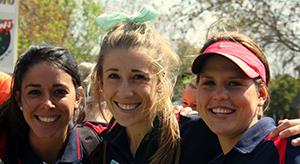
Photo: Hatsu Mphatsoe |
On Casual Day, Friday 4 September 2015, the UFS Health and Wellness Centre and KovsieSport launched a healthy lifestyle on the Bloemfontein Campus with the focus on Walking and Running routes. The theme of the event was set by the many flying tutus, together with outrageous outfits that were to be seen in the crowd of anxious and excited runners.
There are a total of six walking and jogging routes, stretching over the central and western parts of the Bloemfontein Campus. Colour-coded arrows indicate the various routes, ranging from a three-kilometre route (green) to an eight-kilometre route (black). The 2,5 km route is accessible for people with wheelchairs.
According to Arina Engelbrecht, who is spearheading the Wellness programme, a board will be erected in front of the Callie Human Centre later on, explaining the various routes. All the routes start and finish at the Callie Human Centre.
This initiative is receiving support from management, who requested that a healthy lifestyle be encouraged amongst students and staff. With this project, staff and students can train and exercise in a safe environment. The routes are also wheelchair friendly, and will be expanded to cycle routes in the future.
Various departments showed their support in numbers, bringing together teams that competed. Staff and students were excited to see what bends and turns lay ahead of them on the trails. Prof Nicky Morgan: Vice-Rector: Operations, cut the ribbon at the official opening of the routes. Morgan himself was extremely excited about the event, as he navigated his way energetically between the runners and walkers.
In his opening speech, Pieter du Plessis, Executive Assistant to the Vice-Rector: Operations, talked about the importance of keeping healthy by doing something as simple as walking, an inexpensive method of keeping healthy.
Arina commented: “We received some great feedback from the masses that attended, and many said they will continue to make use of the routes.”
This event forms part of the human project of the UFS, and will also create awareness amongst staff and students about persons with disabilities.